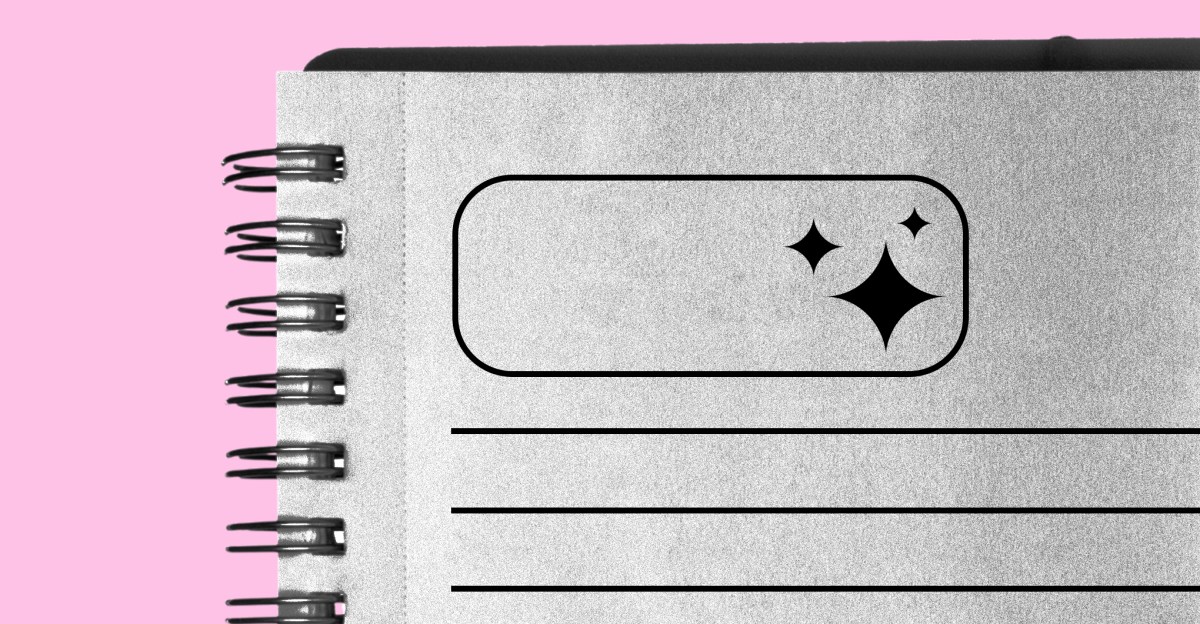In July 2023, I deleted the Day One journaling app from my phone and laptop. It was perhaps the best thing I’ve done as a lifelong diarist.
The decision was prompted by Apple announcing its Journal app at WWDC that year. In that keynote, Apple said it would use “on-device machine learning” to provide prompts based on the content in your iPhone — things like contacts, photos, music, workouts, podcasts, and location data. The idea gave me the ick. Mainly because the app was described as a riff on the Memories feature in the Photos app, which at the time had “intelligently” resurfaced a photo of my mother’s open casket.
I had flashbacks to that moment last week when I saw a demo of Google’s take on its new Journal app. Except Google’s Journal app leans harder into AI than Apple’s version ever has. In addition to AI-powered journaling prompts, the on-device AI will also provide summaries of your entries. There’s also a little calendar view that assigns a little emoji signifying your mood based on whatever you journaled that day.
At my demo, Google told me the idea was to make journaling easier — much in the way that Gemini simplifies other writing tasks, like emails and document summaries. Sometimes, I was told, it can be hard to know what you should journal about. Looking back can also be difficult. The point of Gemini in this instance was to make life a little more convenient and helpful.
That’s nice, except journaling isn’t supposed to be easy or convenient.
Ask any writer: a blank page is meant to be wrestled with. And in journaling, the only prompt you ever need is “What happened today and how do I feel about that?”
It’s a deceptively simple question. Some days, it’s abundantly obvious what you should write about. A great tragedy, a joyous occasion, an event you’ve been looking forward to — anything that sparks a strong emotion is an obvious prompt. But most days pass without much happening at all, forcing you to sift through mundane minutiae to find anything worth recording. That’s the point. Honing your discernment, exercising your brain, wracking your vocabulary to find the right phrase to express your inner world. These are not things that are supposed to be easy.
There’s one quote in the book Four Thousand Weeks: Time Management for Mortals that sums it up for me. “It isn’t really the thought that counts, but the effort — which is to say, the inconvenience. When you render the process more convenient, you drain it of its meaning.”
I don’t always agree with author Oliver Burkeman about this. I find no meaning in toiling over hand-washing dishes, and am eternally grateful to the inventor of the dishwasher. But as it pertains to Big Tech’s never-ending quest to simplify writing with AI, I wholly agree that the struggle is what makes the process worth anything.
Limitations force me to prioritize what information needs to be recorded and sit with my thoughts
It reminds me of Google’s much-decried Gemini ad in which a father uses the AI to write the perfect fan letter to Olympian Sydney McLaughlin-Levrone and ends up with milquetoast slop devoid of heart. There, too, Google seemed to forget that the effort of writing the letter, of putting yourself out there, is what makes fan letters authentic and meaningful.
I’ve found that it pays to make journaling as “inconvenient” as possible. After I deleted Day One, I returned to writing in a physical journal, and that dramatically improved my mental health, critical thinking, time management, and memory. Multiple studies have shown that handwriting is better for memory retention and learning compared to typing. A lot of that is because it’s inconvenient. Your hand cramps faster when writing with a pen, ink is hard to erase, and in my case, my brain thinks faster than my hand can move. Those limitations force me to prioritize what information needs to be recorded and sit with my thoughts in a more intentional way. It means when I want to look back, I have to remember when things happened precisely because there’s no search bar. Barring accessibility reasons (in which case, voice recorders may be a good alternative), I’d argue that anyone interested in journaling ought to go analog.

Going analog also affords you privacy. Journaling is often not about the little things in life. (Though no one’s stopping you from writing an ode to that one life-changing bubble tea you had with lunch.) Many people journal to grapple with Big Feelings. Breakups, deaths, anxieties, ennui, and the practice of finding joy in a life that is finite, cruel, and unfair. These are private things meant for no one’s eyes except the writer. It doesn’t matter that Google says the Journal app is fully on-device, lockable, and deletable — nothing connected to the internet ever feels truly yours.
An AI summary with pertinent takeaways of your journal entries is also fundamentally flawed. You’re supposed to flip through entries, sifting through scatterbrained sentences for nuggets of meaning. You’re supposed to remember the person you’d once been and reflect on who you are now. It’s meant to be like finding a message in a bottle, or a $20 bill in an old coat pocket. I doubt reading an AI summary of a journal entry could ever give me the same feeling.
While writing this, I kept thinking back to summer 2009. Fresh after my first real heartbreak, I filled an entire paper journal with tear-stained pages, blotchy ink, and horrendous poetry that even the most emo Tumblr girl would never admit to writing. When I couldn’t sleep or eat, I’d blast Adele’s album 21 and write every bit of self-doubt, loathing, rejection, longing, anger, betrayal, and grief that not all loves could last forever.
Six months after I filled that entire book, I sat down to read every single page. It was the definition of cringe, but the hourslong process made me finally see how I’d lost myself in a relationship that had run its course. It helped me forgive and move on. When I was done, I burned the book with an old cigarette lighter on my shitty new apartment’s roof. Watching the pages turn orange then black, I’d never felt freer in my young life. Deleting an AI journal app will never feel quite as cathartic.
37 Comments
Read the full article here














